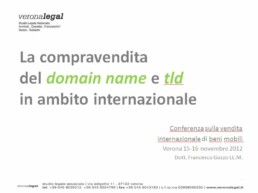Mum, the plane is late!
[:it]
What happens if the plane lands with a significant delay? Is the passenger in any way entitled to a damages?
These questions were recently answered by the European Court of Justice, which ruled in the Judgment of 23 October 2012, No. 629/10that in the event of passenger disembarkation with a three-hour delay after the scheduled timethe latter is entitled to request the lump-sum compensation scheduled for the cancellation of the flight.
See on this point the EC Regulation No. 261/2004 which provides that, in the event of flight cancellation, passengers may receive lump-sum compensation of between EUR 250 and EUR 600.
The above principle makes application of what has already been established at Sturgeon judgment of 19/11/2009in which the Luxembourg courts held that passengers of delayed flights can be assimilated to passengers of cancelled flights as regards their right to compensation.
It is clear that compensation cannot be claimed if the air carrier proves that it was caused by extraordinary circumstances that could not have been avoided even if all reasonable measures had been taken, i.e. circumstances beyond the air carrier's actual control.
[:]
The digital work. A horror for our legal system?
[:it]More and more often we speak of 'digital work"whose meaning seems to be increasingly understood by users, without that there is, indeed, a real and effective feedback from the legislator.
In fact, as is well known, a digital work is understood to be an intellectual work that is characterised by the fact that it contains a so-called "corpus mysthicum" (such as originality, creativity, the
characteristics of innovativeness; therefore intangible connotations) and not having a "corpus mechanicum"(think for instance of the musical score or the traditional sheet of paper on which a work is written).
It is important, on this point, to remember that the digital work, precisely because of its entirely immaterial connotation, must not be confused with the CD/DVD containing multimedia files. Rather, the work is identified precisely in the files it contains, i.e. in a set of electrical impulses expressed in binary code.
It is important, on this point, to differentiate digital works in the strict sense, from the digitised works"(i.e. the simple DVD or CD, inside which digital files are imprinted and stored). In these cases, in fact, the physical format has a strong influence on distribution and musical, editorial and audiovisual works, already fully protected, are transported in digital format for distribution reasons.
Classic exampleTherefore, a digital work is the digital photograph and/or video, not necessarily being associated with a paper reproduction.
It goes without saying that the problems associated with the relationship between copyright and digital works are obviously enormous. Given the ease with which a person can 'take possession' and use a digital work of a third party through the use of the web.
Our legal system, however, has not yet defined the term 'digital work' in copyright law, and has not yet had the opportunity to regulate such disciplinedespite the fact that they have been needed for years.
[:]
Internet jurisdiction? The Court of Justice gives an answer to this 'international intrigue'.
[:en]Published on 25.10.2012 a very important judgment of the Court of Justice which resolved an issue that had been open for several years. In fact, the European court was asked to decide on the possibility of an EU citizen, to be able appeal to the courts of the State in which it has its centre of interestsin order to claim compensation for the damage caused by the violation of one's rights to the person, by means of content placed on the web by a third party, via a website.
The Court was called upon to decide on two very similar issues:
- the first case had seen a German citizen, who had previously been convicted of murder and was later admitted to probation, apply to the German court for damages for content put online by an Austrian company, which infringed his personal rights;
- in the according toSimilarly, a French citizen sought an order to pay a sum of money against an English online newspaper that had published untrue information about him.
The Court of Justice, called upon to rule on these disputes, stated that there is the alternative course of action:
1. in the courts of the Member State where the person who has published the damaging content is established;
2. in the place where the injured party finds its centre of interest;
3. before the courts of any Member State on the territory of which anetworked information is accessible or has been accessible.
The judgment reasoned its decision on the basis of Article 5(3) of the Regulation (EC) 44/2001regulating, among other things, jurisdiction in the European context.
This rule, in fact, states that 'a person domiciled in one Member State may be sued in another Member State in matters relating to tort, delict or quasi-delict, in the courts for the place where the harmful event occurred or may occur. "
Very interesting this judgement and certainly not insignificant, which gives certainty in another situation of violation of personal rights in the field meta-territorial, i.e. through the use of the web platform.
[:]
Speech at the conference on the international sale of movable property.
[:en]On 15.11. on the occasion of the conference on the international sale of movable property in the Aula Magna of the University of Verona, I had the pleasure of briefly presenting a topic that I have already dealt with in the following articles: the sale of the domain name e tld (internationally).
If it is of interest to you, here are the slides of the conference.[:]
But could an American in Rome also use the .eu?
[:en]On date 12 July 2012 the European Court of Justice issued a very interesting ruling in the field of internet law and e-commerce. Specifically, it stipulated that top-level domains (Tld - top level domain) ".eu" are only reserved for companies that have "its registered office in the territory of the EU'..
In particular, under EU law (Article 12 of Regulation No 874 of 2004) registration of the Tld '.eu' can only be applied for by the "domain names [...] of registered national trade marks, registered Community trade marks, [...] and holders or licensees of prior rights."
The Court of Justice, in interpreting the above-mentioned rule, considered that for "licensees of pre-existing rightsi' may not include companies or persons from the european union who limit themselves, at the request of a trade mark proprietor established in a third country, to registering the trade mark without being allowed to use it in the course of trade.
The present case, to make the matter clearer, involved a American society(Wlash Optical), which is active in the online sale of contact lenses and other eyewear. It has operated www.lensworld.com since 1998 and became the owner of the Benelux Lensworld trade mark, registering it on 26 October 2005. In November 2005, it decided to enter into a licence agreement with Bureau Gevers, Belgian company advising on intellectual property issuesto register the domain 'lensworld.eu' in its name, but on behalf of Walsh Optical itself. at the UERid.
One year later, Pie Optiek, a Belgian company competing with the American company, also applied for registration of the website "www. lensworld.eu." This request is, however, rejected.
Pie Optiek therefore brought an action against the American company, claiming that, as it was based in a third country, it was not entitled to use the .eu domain. The court of first instance dismissed the action. Pie Optiek appealed against the judgment. The Brussels Court of Appeal referred the case to the Court of Justice requesting an interpretation of Article 12(2) of Regulation No 874 of 2004. The Court thus holds that a person who is merely authorised by the proprietor of the trade mark, established in a non-member country, to register in his own name, but on behalf of the licensor, a domain name identical or similar to the trade mark itself, without, however, being permitted to make commercial use of it, cannot be regarded as a licensee of prior rights.
The Court notes on this point how the .eu top level domain was created in order to increase the visibility of the internal market in virtual Internet-based tradeby offering a clearly identifiable link to the European Union, the associated regulatory framework and the European market, and by allowing EU companies, organisations and natural persons to register in a domain that makes this link obvious.
For this reason, domain names should only be registered if requested by any party that meets the criteria of presence in the territory of the European Union. More precisely, by companies that have their registered office, central administration or principal place of business in the territory of the Unionby any organisation established in its territory as well as by any natural person residing in the territory of the European Union.
[:]
There is a Frenchman, a Spaniard, an Italian and YouTube.
[:en]Can YouTube broadcast clips from a television channel on its platform? And if so, what role does it play from a civil law point of view? These certainly highly relevant and important questions were answered by the Tribunal de grande instance of Paris.
French judges have come to decide on a dispute brought by the television company TF1, which was claiming damages of €150 million from YouTube for violation of the Intellectual Property Code. In particular, of Article 216-1, which makes the diffusion and retransmission of an intellectual work subject to the authorisation of the rights holder, and of Article 1382 of the Civil Code (corresponding to our Article 2043 of the Civil Code governing non-contractual liability).
The transalpine judges decided to reject all of TF1's claims and ordered TF1 to pay EUR 80,000 in legal fees.
The ruling is interesting in that it states that "the economic model developed by the YouTube company in its as a hosting provider is neither prohibitednor unlawful and no diversion of customers"can be imputed to it. According to the French judges, in fact, YouTube and television constitute two different types of business.
Clarity is also provided on the of YouTube, which would remain mere hosting not being in any way assimilated with publishing.
The plaintiffs on this point had observed that YouTube performs activities beyond those typical of thehosting. For example, YouTube implements a prior check aimed at blocking and censoring certain content that YouTube "considers contrary to its editorial line"Google also automatically acquires the copyrights necessary to exploit the content posted by users. Despite these observations, the Court stated that these circumstances, would not be suitable and sufficient to qualify the web giant as a 'publisher'.
Finally, the judgment retraces what has already been affirmed by the Spanish case law of the Juzgado de lo Mercantil in Madrid, 20 September 2010which disclaimed any responsibility on the part of YouTube for the content posted by users (see also "The hosting contract and the hosting provider's liability profiles e Responsibility of the search engine in the case of 'caching' (if you can)).
On this point he also added that the use of the advertisement on some of the published videos would not be sufficient in itself to lead to the loss of status intermediary.
Internet operators are therefore mere intermediaries and, as such, cannot be held responsible for the content conveyed by third parties, let alone be equated with publishers.
Ultimately, it is felt that the european case law is finally moving towards a difficult framing of the duties and responsibilities of search engines and hosts.
[:]
Responsibility of the search engine in the case of 'caching'.
In May this year, the Industrial Property Section of the Court of Florence had to decide on a very interesting issue for all web users. The case is easily summarised: Titius, entrepreneursurfing the web he discovers a site in which photos of him are reproduced and defamed their company name.
Since the webmaster or site operator could not be traced from the site, he decided to contact Google Inc. directly (US headquarters), asking them
by remove the link from the search engine to the disputed site. Following the rejection of GoogleTitius decides to bring an action.
On 12.5.2012, the Court of Florence issued an order excluding Google's liability for the following reasons:
- the activity of search engines is a mere caching, formerly Article 15 of Legislative Decree 70/2003;
- the search engine is obliged to remove links only by order of the competent body.
Dwelling briefly on the first point, it may be noted that the ordinance is of the opinion that search engine caching is a mere caching activity, since it is limited "indexing of sites and caching of their content, with temporary storage of information". Internet operators, therefore, appear to be mere intermediaries and, as such, not can be considered responsible for content conveyed by third parties.
As to the second point, the order focuses on the obligations of search engines when they receive requests to remove or disable access to certain content. The Court states on this point that "theactual knowledge of the alleged unlawfulness of the content of the website in question cannot be deduced even from the content of the party's warnings, since they are unilateral statements."
Moreover, about the knowledge of offences, these are not presumed on the basis of mere complaints by network usersbut it is necessary that a "competent body declared the data to be unlawfulor ordered the removal or disabling of access to them, or that a damage has been declared to exist'. or, again, 'that the ISP itself is aware of such a decision of the competent authority. "
This decision seems to replace the previous jurisprudential orientation that, applying legislative decree 70/2003 extensively, considered it sufficient for the subject to communicate to the intermediary the link of the site containing the allegedly infringing material.
This orientation, in the opinion of the writer, rightly overtaken by the order under review, which is, moreover, very important in the sector, since clear directives are issued and the liability of legal figures that are not yet completely well defined is firmly delineated.
Defamation on Facebook. Better watch out, that if the car runs out of petrol....
[:en]Facebook, a space of great social and commercial interest. A new way to share one's thoughts, ideas and business insights. A new multimedia piazza.
This statement, which at first might appear to be a mere assertion of "para-sociopolitical" is actually becoming increasingly of legal interest. Indeed, one wonders what can happen if one posts an offensive comment on their profilefalse or simply vulgar? Is it to be assumed that such conduct is actually carried out in a public place or even in the press?
This question, which as you can understand, is no longer of little interest, was answered on 1 October by the Court of Livorno. The Court on this point decided the conviction of a woman for "defamation", with the aggravating circumstance ".print media"because she insulted her former employer (who had fired her) on her Facebook profile.
The Court of Livorno, has therefore created a new orientation in the jurisprudence on the merits, going against a jurisprudential orientation of the Supreme Court, according to which "for the purposes of the configurability of a criminal offence committed by means of the press, the definitions that Article 1, Law No. 47 of 1948 provides of the press and printed matter are not susceptible to analogical and/or extensive interpretation."
It will therefore be necessary for each user to pay more and more attention to the comments posted on FB, since these not only have purely social and relational consequences, but may even profile possible civil and criminal liability.
[:]
The chain of Saint Anthony is broken. At this point, does the devil still wear Prada?
[:en]A few days ago, the Court of Cassation addressed a topic that is now part of everyday language: spam. This activity, also known as the "chain letter"is a vehicle used by many companies in order to recruit the largest number of people for economic purposes. The classic example and technique used is to entice surfers to subscribe to a service in exchange for a
homage.
In an attempt to stop this practice, the Supreme Court has ruled that the behaviour of website owners who focus their business on paying incentives to subscribers for the sole purpose of get data from new subjectsis to be regarded as unlawful in fact.
Specifically, the Court stated with Judgment No. 37049 of 2012, that "the conduct of the owner of websites focusing on the payment of incentives to members on the basis of the mere recruitment of new persons rather than on the sale of specific goods or services is unlawful".
The basis of this reasoning is mainly centred on the prohibition of 'pyramid selling' in theArticle 5 of Law 173/2005. This practice, in fact, is based on the propaganda activities of core business structures, focused exclusively on increasing the ranks of users and not on the promotion of any service or product.
Importantly, this practice is also unlawful if themembership is voluntary, since, as the Court states, 'the incriminating provision does not require involuntary adherence as a precondition for the existence of the offence'.
Interesting to see how this principle can and will be applied to the new world of social-network, certainly very suitable platforms for the development of such activities.
[:]
The hosting contract and the hosting provider's liability profiles.
[:en]In recent years, the website is no longer a simple showcase used by companies to provide general information and indications on a company's activities, but rather a medium and tool for work and promotion.
Before addressing the contractual type of 'website creation', I consider it necessary to go into a very brief analysis of what is the basis of this entire contractual relationship, the ground on which web designers, in fact, carry out their activity: the web hosting contract. Just as land is needed to build a building, in the same way, web space must be acquired to publish a site. The basis of all this is therefore the so-called 'web hosting' contract, which could be defined as the contract by which a party acquires space on one or more servers owned by a hosting provideragainst payment of a fee.
The web hosting contract falls into the category of atypical contracts, i.e. those contracts that are not regulated and governed directly by the civil code, and ultimately consists of a provision of services. The hosting provider, more specifically, makes space available to another party on one or more computers to host pages web.
One of the most legally relevant elements in this type of contract certainly concerns the provider's liability for the data stored on its servers by the operators of the sites with which it has concluded a hosting contract.
This profile is regulated by Article 16 d.l. 70/2003 (legislative decree by which the Italian legislator transposed the EU directive 2000/31 EC). Pursuant to that article:
in the provision of an information society service consisting of the storage of information provided by a recipient of the service, the provider is not responsible for information stored at the request of a recipient of the serviceprovided that this provider:
a) is not actually aware of the fact that the activity or information is unlawful and, as far as claims for damages are concerned, is not aware of facts or circumstances that make manifest the unlawfulness of the activity or information;
b) not as soon as they become aware of these facts, upon notification by the competent authorities, act immediately to remove the information or to disable access.
L'Article 17 of the decree also provides that
the lender is not subject to a general surveillance obligation information it transmits or stores, nor to a general obligation to actively seek out facts or circumstances indicating the presence of unlawful activities.
In this regard, an important 2009 judgment of the Court of Romein which the Court sought to clarify and specify the scope of the aforementioned legal provisions, stating that "although the Internet provider is not subject to a general obligation to monitor on stored content, as this would result in unacceptable strict liabilityhe is however subject to liability when it does not merely provide access to the network, but provide additional services (caching, hosting ) and/or set up a control of information and, above all, when, aware of the presence of suspect materialrefrains from ascertaining the unlawfulness and from removing it or if, being aware of the unlawfulness, omits to take action".[1]
The Court, therefore, given that there is no general obligation of surveillance, considered necessary for the establishment of civil liability on its part, the knowledge and awareness on the part of the provider of unlawful information or of facts and circumstances which make that unlawfulness manifest, and the failure to remove that information as soon as it becomes aware of those facts and upon notification by the competent authorities. [2]
The Court of First Instance, in this judgment, takes up the concept of strict liability, according to which a person may be liable for a tort, even if it does not result directly from his or her own conduct and is not attributable to the person's own wilful misconduct or fault. This deviates from the general principle of liability, according to which a precise causal link between the individual's conduct and the tort itself is required.
This article, however, must be regarded as a pure and simple outline of a very complex, detailed and constantly evolving subject. A kind of small explanation of what are the legal relations between new types of subjects. Interesting, however, to see how, although the instruments within society evolve, the categories and legal institutions of the civil code always remain the only true basis for regulating commercial and social relations.
[:]









